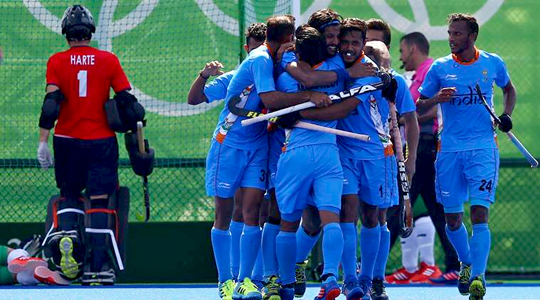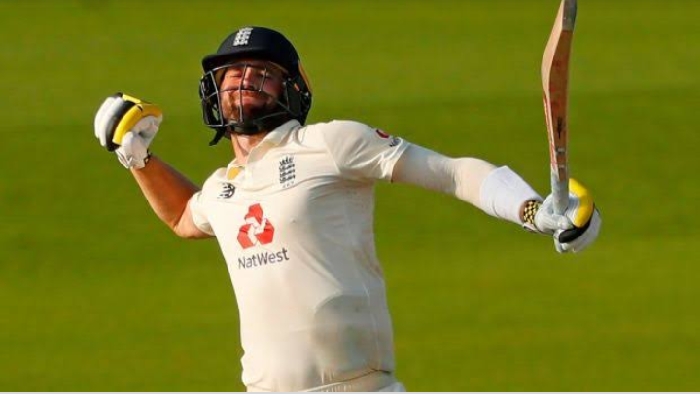Rio de Janeiro, Aug 7: The men's hockey team and army rower Dattu Baban Bhokanal provided the few bright spots while tennis ace Leander Paes made an early exit on a largely disappointing opening day at the Rio Olympics here.
The men's hockey team broke a 12-year-old Olympics jinx by winning their opening group league encounter against minnows Ireland, while Bhokanal entered the quarterfinals by finishing third in his heat in men's singles sculls rowing competition.
Those were the only bright spots as the Indian contingent faced reversals in the shooting range, tennis court, table tennis and weightlifting arena on Saturday.
On the tennis court, Paes' dream of winning his second Olympics medal -- after a bronze in 1996 Atlanta -- in his record seventh appearance was blown away when he and his doubles partner Rohan Bopanna were knocked out in straight sets in the opening round by the Polish pair of Marcin Matkowski and Lukasz Kubot. The Indians lost 4-6 6-7 (6-8).
An emotional Paes did not hide his disappointment and said that he had "become a soft target" and that was the reason why people are "taking potshots" at him.
Later, star woman player Sania Mirza, the world number one in doubles, too could not lift the Indian contingent's sagging spirits as she and much lower ranked partner Prarthana Thombare went down to the Chinese pair of Shuai Zhang and Shuai Peng.
Zhang and Peng won a closely contested match 7-6 (8-6) 5-7 7-5 that lasted two hours and 44 minutes as the Indian duo did put up a stiff resistance.
Indian shooters also failed to sparkle as medal hopeful Jitu Rai finished a lowly eighth in the men's 10m Air Pistol final, while Apurvi Chandela and Ayonika Paul crashed out in the qualification round of their respective events itself.
Army's Jitu, bronze medallist at Incheon Asian Games in the event in 2014, shot an overall 78.7 to finish eighth in the field of eight finalists to become the first shooter to crash out of the final round.
The 28-year-old Jitu got off to a poor start and could not recover from it in a highly competitive line-up, which included the likes of Hoang Xuan Vinh, Pang Wei, Wu Felipe Almeida, Tuzinsky Juraj, Jin Jongoh, Gontcharov Vladimira and Giordona Giuseppe.
However, Gurpreet Singh, India's other participant in the same category, failed to even make the final.
Other Indian shooters in the fray -- Apurvi and Ayonika -- also crashed out in the 10m air rifle qualification round, finishing way behind the leaders.
Chandela shot an overall 411.6 to finish 34th out of 51 competitors while Paul ended further down at 47th place with a total score of 403.
Meanwhile, the Indian table tennis quartet led by veteran Achanta Sharath Kamal ended its campaign on the opening day itself as all four players lost their first round matches.
Save Mouma Das, who was blown away by 0-4 margin in just 21 minutes, Sharath and Soumyajit Ghosh got a game each from their respective opponents before going down 1-4. Debutant Manika Batra was the best performer as she lost by a scoreline of 2-4.
Interestingly, the cumulative duration of India's Olympic table tennis journey was just 139 minutes (2 hrs and 19 minutes).
India's most decorated player Sharath lost to another veteran Crisan Adrian of Romania 11-8 14-12 9-11 11-6 11-8 in 35 minutes. Adrian was world number 20 at one point of time in his career and is currently a top-100 player (ranked 90th).
It was no different in the other match in the men's section for world number 68 Soumyajit Ghosh, who also made a first round exit, losing to Padasak Tanviriyavechakul 1-4 in 35 minutes.
In weightlifting, Saikhom Mirabai Chanu put up a highly disappointing performance as she could not get an overall total in women's 48kg after failing to lift the entry weight in any of her three attempts in clean & jerk section.
In a field of 12 lifters, she was one of two who did not finish (DNF) her event.
Mirabai failed to lift 104kg in her first attempt in clean and jerk, followed by two more attempts to pick 106kg. In both her second and third attempts, the Indian simply could not lift the weight.
Interestingly her personal best at clean and jerk is 107 kg.
The day had, in fact, commenced promisingly when rower Bhokanal entered the quarterfinals of single sculls by ending up third in heat 1 of the 2000m race with a timing of 7 minutes, 21.67 seconds, behind Angel Fournier Rodriguez of Cuba and Mexico's Juan Carlos Cabrera.
This was followed by the men's hockey squad's hard-fought 3-2 win over minnows Ireland, taking part in the Games after 108 years, in pool B opener through goals from Rupinderpal Singh, who struck twice from penalty corner, and V R Raghunath.
It was the first occasion since 2000 Sydney that the men's team had won its opening league encounter in Olympics.







Comments
Add new comment